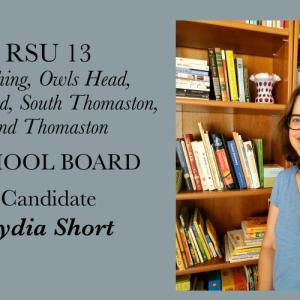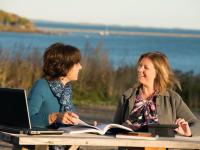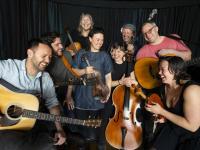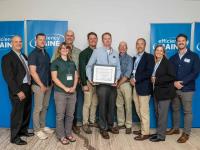RSU 13 School Board Candidate Lydia Short
On November 4, Rockland voters will consider three candidates to fill two Rockland seats on the Regional School Unit 13 (Cushing, Owls Head, Rockland, South Thomaston and Thomaston) School Board. They are Doug Curtis, Jr., Lydia Short and Jessie Davis.
PenBayPilot.com has circulated questions to the three school board candidates. Here, Lydia Short responds to them:
I am Lydia Short and I would be honored to serve as a Rockland representative on the Regional School Unit 13 School Board alongside the current members of the Board.
I was born and raised in Central Maine and moved to Rockland eight years ago. After 15 years living out of state, I am so glad to be home.
I’ve been involved in the Rockland community in various ways over the years, including as a parent of a student at South School and a graduate of OHS Class of 2023, host family for three exchange students, member of Midcoast Parent Advisory Committee (supporting the transition of special education services for four year olds from Child Development Services to Department of Education), parent representative to Penquis Head Start Policy Council, overnight volunteer with Rockland Emergency Warming Shelter, and board member of Midcoast Diaper Project.
Professionally, I have worked as a social worker in various settings, including child welfare, school-based clinical social work, and as a special education school social worker.
Currently, I am a social worker with a small private practice in Rockland. It has been a long and unexpected journey to this point in my life. Two significant intersections on my journey — meeting and marrying my spouse, who was an active-duty US Army paratrooper at the time, and becoming a parent, both step and not-step(?) to three beautiful human beings — gave me the great gift of learning about and caring for people who have very different life experiences, perspectives, expectations, and opinions from my own.
As an army spouse, I was selected to be a Tillman Scholar. I invite you to read more about the Pat Tillman Foundation here. The Tillman community helped me both to articulate and live out my core values: Service, Scholarship, Humble Leadership, and Impact.
As a parent, I’ve experienced the joy and sorrow, pride and disappointment, hope and fear of watching a child grow into themselves as they navigate this wild world.
What do you hope to accomplish as a public K-12 school board member?
I am running for school board because I value service to the community and I have the time and skillset necessary to engage with the community and the RSU 13 team to ensure Rockland youth continue to access high quality public education. I want to use my skills as a listener and collaborator to represent the diverse opinions and values of the Rockland community and be closely involved in adopting policies, monitoring progress, advocating, and holding the school system accountable to the community.
How do you view the role of public education in the US, in Maine and in the RSU 13 communities?
It costs a lot of money to educate our kids, and it costs a lot more when we don't. Using property taxes to pay for public education is a fundamentally unfair practice and we are feeling the burden. This is an issue to be addressed at the state level. Meanwhile, as a board member I will have the opportunity to identify additional funding streams, through grants and community partnerships, to supplement the school budget.
I believe that free public education for all our children is critical to the continued strength of our community and our democracy. Reading, writing, and ‘rithmatic are necessary skills both for conducting day-to-day activities and for accessing the freedom that comes with knowledge, critical thinking, and curiosity.
Is there enough fresh food from area farms being integrated into RSU 13 free meal program?
Before kids can learn, their basic needs must be met: bellies full, bodies warm and well rested, minds at ease.
Our community is a generous one. Our schools have adopted a generous approach to feeding our kids, providing free breakfast and lunch for all students. Having access to nutritious school meals has tangible benefits, including improved behavior, academics, and overall nutrient intake. Between the Local Foods Fund, the Act to Promote Local Seafood in Schools, and several grants awarded over the years, the RSU 13 Board seems committed to, and I fully support, accessing the fresh nutritious food available from our local farmers and fishers.
This is an area that could be further leveraged both to reduce food services’ expenses and increase investment in the local economy using the District’s purchasing power to support area agri/aquaculture.
What is your understanding and opinion of the implementation on of a social emotional learning approach?
Once kids are fed they can begin to focus on learning. I’m a big fan of “back to the basics” in education. By “back to the basics,” I mean that to really grasp reading, writing, and ‘rithmetic skills, we must also be learning how to learn. I’ve been impressed with the skills my kindergartener is coming home with. He can talk about character traits of kindness, respect, and responsibility. He can name his emotions and tell me different ways to calm down when needed. All need learners require these “social emotional” skills so we can get our brains in gear to access the more “academic” skills and knowledge.
What is your opinion of a cell phone-free policy in schools?
Now the kids are fed and they can handle their emotions, next comes staying focused on learning. From anecdotal reports, it sounds to me like the current cell phone policy is working well in schools. Since our youth can manage their emotions and make responsible choices, our educators can trust them to adhere to the cell phone policy.
Speaking of trust, I trust our educators to use their own education, experience, curiosity, passion, and dedication to make appropriate instructional decisions that benefit our students.
Should the subject of personal finance be addressed in all grades?
Does the curriculum adequately teach all children and teens about their role in a participatory democracy?
RSU 13 has adopted Maine’s system of Learning Results, which includes the core content areas of career and education development, English language arts, health education and physical education, mathematics, science & engineering, social studies, visual and performing arts, and world languages. I believe the curriculum addresses, in a developmentally appropriate way, the role of youth in participatory democracy, the subject of personal finance, and skills in science & technology. Could there be more? Sure. Always.
Are there books that you would want pulled off the library/classroom shelves.
Final point on trust: I trust the school librarians and educators to maintain a variety of books and periodicals that represent the variety of experiences of our community and communities around the world. We are educating our children to be critical thinkers. I trust our children will read books on topics they are unfamiliar with and topics they disagree with. I trust they will think critically and ask their trusted adults for clarification and support when needed.
How will you as a board member, help reduce the fiscal load on the taxpayer to fund education and maintain facilities?
What books are you reading these days and which do you recommend others read?
And speaking of books, a classic in our family is The Wolf, the Duck, and the Mouse by Mac Barnett, which has this line, spoken by the duck who has taken up residence in the belly of the wolf, “I may have been swallowed, but I have no intention of being eaten.” Morgan Talty’s Night of the Living Rez and Fire Exit and Meghan Gilliss’ Lungfish are recent favorites. I count on the booksellers at Hello Hello for consistently excellent recommendations.
Anything else you would like to address?
I look forward to continuing conversations with Rockland residents and I welcome questions and ideas from all. Feel free to reach out to me at lfshort@outlook.com




























